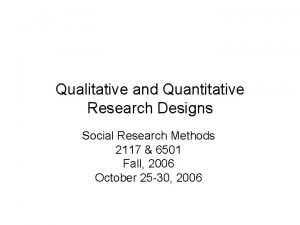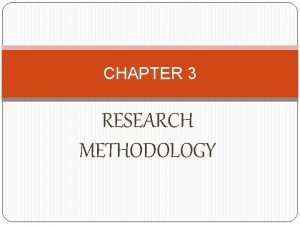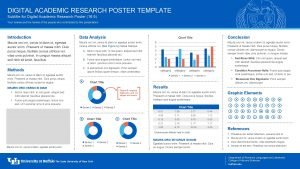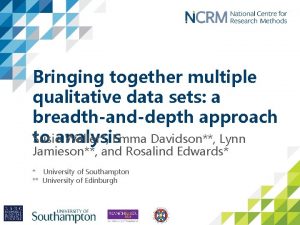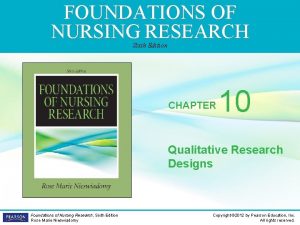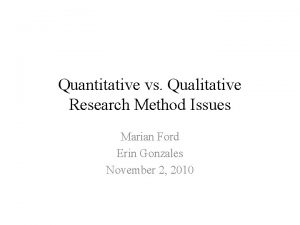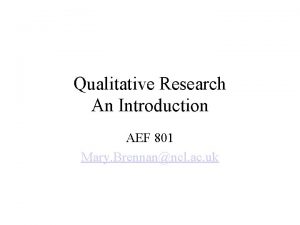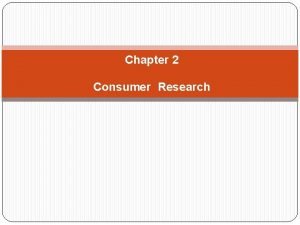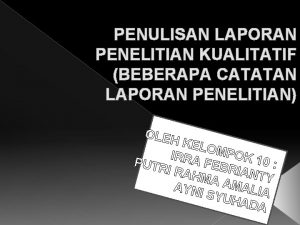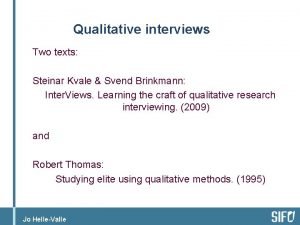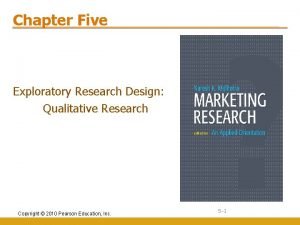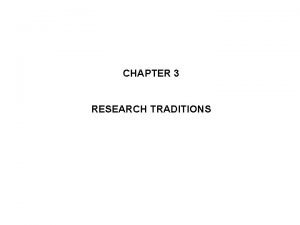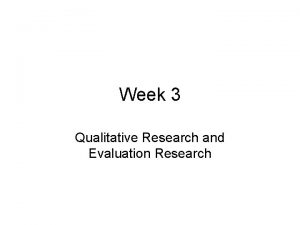Qualitative Research What is qualitative research What qualitative
































- Slides: 32

Qualitative Research What is qualitative research? What qualitative research is feasible in A-Level Geography? Can I see some examples of qualitative research in practice?

Qualitative Research 1. 2. 3. 4. Peter Jackson: Reading a Market Dorothea Kleine: Observing the Everyday Eric Olund: Analysing Promotional Literature Richard Phillips: Depth Interviewing on Changing Places

How to read a market • Start with students’ first impressions… • Lively, colourful, vibrant • Smelly, dirty, unhygienic • Natural, authentic, touristy

Some basic questions • • • How many stalls? What are they selling? Where does produce come from? How are goods displayed (‘the flash’)? How is produce labelled? Best and worst location (‘pitch’)? Who are the traders (gender, ethnicity, age)? Who are the customers? How do prices compare to neighbouring shops?

Where’s it from? (ideas of provenance and locality)

Frontstage/backstage

Who goes there? (customers and traders)

Food labels (accreditation and authenticity)


Food markets as field sites • Good for observational research (engaging the senses, changing places…) • Teaching about sustainability (and complicating ideas about ‘food miles’) • Trade-offs and compromises (intensive production often cheaper than premium-priced organic food) • Making connections (local to global, farm to fork).

Qualitative Research 1. 2. 3. 4. Peter Jackson: Reading a Market Dorothea Kleine: Observing the Everyday Eric Olund: Analysing Promotional Literature Richard Phillips: Depth Interviewing on Changing Places

Example: Everyday media usage • (when the internet was young…. )


Observation: Aspects to consider • - informed consent • - role of the researcher: observer – participant continuum • - systematic vs flexible observation (what will be documented? How? E. g. observation sheets) • - natural vs artificial situation • - time sample • - perception gaps due to researcher positionality (e. g. age, gender, ethnicity, cultural background…. ) • - combination with other methods: especially interviews • - However: Not all phenomena can be observed!

Example: Shopping Decisions • (what “ethical” shoppers do vs what they say they do)

Work with Shoppers

Qualitative Research 1. 2. 3. 4. Peter Jackson: Reading a Market Dorothea Kleine: Observing the Everyday Eric Olund: Analysing Promotional Literature Richard Phillips: Depth Interviewing on Changing Places

Media Places: Analysing Promotional Literature Dr Eric Olund e. olund@sheffield. ac. uk Department of Geography University of Sheffield City Centre Master Plan 2013

From AQA… 3. 2. 2 Meaning and representation • The importance of the meanings and representations attached to places by people with a particular focus on people's lived experience of place in the past and at present. • How humans perceive, engage with and form attachments to places and how they present and represent the world to others, including the way in which everyday place meanings are bound up with different identities, perspectives and experiences. • How external agencies, including government, corporate bodies and community or local groups make attempts to influence or create specific place -meanings and thereby shape the actions and behaviours of individuals, groups, businesses and institutions. • How places may be represented in a variety of different forms such as advertising copy, tourist agency material, local art exhibitions in diverse media (eg film, photography, art, story, song etc) that often give contrasting images to that presented formally or statistically such as cartography and census data. • How both past and present processes of development can be seen to influence the social and economic characteristics of places and so be implicit in present meanings.

Research Context & Questions • Your local area is undergoing significant regeneration investment, potentially resulting in a significant change in its sense of place. • Qualitative Research Questions: • What meanings do various promotional representations give to the original place? (i. e. what is the problem with the place? ) • What meanings do they give to the regeneration project? (i. e. what is the solution? ) • What meanings do they give to the changed place? (i. e. what are the benefits of the solution? ) • To whom are these meanings addressed?

The Task: 1. Find at least 6 items promoting regeneration in your local area: • Local newspaper articles • Local council website (press releases, councillor statements, planning applications, etc. ) • Local chamber of commerce, business association press releases 2. Consider your search strategy: • What search terms are effective in finding relevant material? • Scale: will you focus on one project, or one neighbourhood/village, or a town/city?

The Task, cont’d: 3. Analyse your material for what it says about the regeneration project(s): a) What does it say? • • What is wrong with the place and why? What changes to place do they promise? What experience and meaning of place do they promise? Who is going to benefit? How? b) How does it say it? c) • How do they present the project—with imagery, with emotive language, with authoritative language? • What do they not say—e. g. what’s good about the place as-is, and to whom? Who or what might be displaced? Who ultimately pays for it? Who gets to decide? Who says it? • What interest does the author(s) have in the regeneration project? • Does this appear to influence how they represent the project?

The Task—Qualitative Extras: • Observation: • The site of regeneration and immediate surroundings • Interviews: • Council officials • Businesses • Residents/general public (participatory methods, e. g. photo elicitation? ) • Archival research: • Previous attempts at regeneration? • Alternative visions for the place? • And of course comparing/contrasting with quant data…

Fundamental Q’s for Representations of Place, Meaning & Experience • What does it say? • How does it say it? • Who says it? • To whom does it say it? • In what context does it say it? Sheffield City Centre Master Plan 2013

Qualitative Research 1. Peter Jackson: Reading a Market 2. Dorothea Kleine: Observing the Everyday 3. Eric Olund: Analysing Promotional Literature 4. Richard Phillips: Depth Interviewing on Changing Places with Emily Smith and Juliet Rowson , Chapeltown Academy

Depth interview Common questions and dilemmas Changing Places • Who to interview? • How to approach an interviewee? • May be longstanding resident, but can be more recent or temporary too • How many interviews? • I’m not experienced/confident in interviewing. What do I do? • How do I conduct an interview? • How should I write up findings? • What do interviews show? • If few, may want to top up with other sources and methods • Build confidence, but spread risk Case study: changing Grimethorpe Emily Smith, Chapeltown Academy

What were the impacts of the mine closure in Grimethorpe in 1993? Mixed methods research 1. Field observations 2. Visual research 3. Depth interview

1. Field Observations a) During my pilot study, there were groups of teenagers stood on the streets. They looked intimidating. It was around 6 pm on a Saturday when I did my pilot study so it was getting dark not e s u a h bec c r a e s y re m th d e rpe – search d b) On the 25 October 2017 at 1; 15 pm, onqu my o i a h t e e hni f Grim y other re c o e t ” l s e i acts fe th my interview an “ p , l l a m m a i o way to the Acorn Centre to do r e f e th et On the w Ov ive m t gd) hthat. October g ’ 25 at around 2: 15 pm I saw a girl who looked t n i d l e d i u e d s o c y o l I t n … t e o shouted a in thme life with XXX, I had abuse gat y(possibly ed mvery eyoung n a p i l d h e t y r h e 14) who was pregnant. She was pushing a som also n ev i t i e – r e s another language from womenclwhen thod ing. Iwwas s o metwo pram with a baby in it. mine e h t f o in figure 2. 0. walking down the road e) On the 25 th October at about 2: 15 pm I went into the Asda c) Also on the 25 th October 2017 I parked Supermarket and on my way out there were two security guards opposite a bus stop where there was a stood by the door who looked very closely at my receipt. (I live near teenage boy that looked as though he was another Asda Supermarket and it is much larger than the one at having to be calmed down by two police Grimethorpe and there are never any security guards that do that. ) officers. outside.

2. Visual Research: Before/After

3. Depth interview Common questions and dilemmas Emily’s answers / responses • Who to interview? • Emily interviewed an ex-miner; would have been ok to interview younger resident too • Contacted through colliery band • Numbers will vary • Probing, semi-structured questions • Verbatim quotes will help • ‘the point of an interview isn’t to be representative, it is to find out the perspective of the interviewee’ (Emily) • Different people see the same place in • • • How to approach an interviewee? How many interviews? How do I conduct an interview? How should I write up findings? What do interviews show?

Age related perceptions of distance: “I think the younger end have moved – such as your age and early twenties – have become more mobile so the going t’… you don’t mind going to Barnsley or Meadowhall or Leeds or whatever its nowt to you that. Well ask an older person… I work with unemployed people and you se: “fancy working in Leeds? There’s plenty of jobs going in Sheffield” and you might as well say there’s plenty of jobs going in China because its other side of world as far as they’re concerned …” Impact of pit closure on family roles: “… traditionally the man went out to work and the women would’ve stayed at home. …Whereas nowadays everybody works dunt they… in fact its other way round nar, int it? Women go art to work while men stay at home…” Impact of pit closure on older miners: “I think from a male point of view [pit closure] had a big impact on the older men. I mean I look at my dad. I mean he’s dead nar like but he wa in his early fifties when he finished at pit like most men that age. I mean that’s all they’d ever known so it affected their confidence and self-esteem cos they’d gone out and earnt money all their life and looked after their families and did what, in their eyes, was expected of em and then lost that. …. a lot of miners have never worked since they finished down pit…. especially the older men…. the blokes who wa in the late fotties early fitties dint know owt else and they never got another job. They went on sick or dole and some of em are still on sick nar if they’re still alive. Yeah I think a lot of it wa that: losing their self-esteem. ”

Qualitative Research 1. Peter Jackson: Reading a Market 2. Dorothea Kleine: Observing the Everyday 3. Eric Olund: Analysing Promotional Literature 4. Richard Phillips: Depth Interviewing on Changing Places with Emily Smith and Juliet Rowson , Chapeltown Academy
 Qualitative research methods
Qualitative research methods Research design for qualitative research
Research design for qualitative research Appendix example in research
Appendix example in research Chapter 3 research methodology sample quantitative
Chapter 3 research methodology sample quantitative Poster subtitle
Poster subtitle Qualitative research meaning
Qualitative research meaning Qualitative research procedures
Qualitative research procedures Thematic map qualitative research
Thematic map qualitative research Qualitative
Qualitative Six types of qualitative research
Six types of qualitative research Research instrument example
Research instrument example Pragmatism and constructivism
Pragmatism and constructivism Result and discussion
Result and discussion What is grounded theory in simple terms
What is grounded theory in simple terms Chapter 10 qualitative research designs author
Chapter 10 qualitative research designs author Projective techniques in psychology
Projective techniques in psychology Data gathering for quantitative research
Data gathering for quantitative research Qualitative analysis skills
Qualitative analysis skills Quantitative observation
Quantitative observation What are the limitations of qualitative research
What are the limitations of qualitative research 5 steps of qualitative research process
5 steps of qualitative research process Gaya penulisan laporan penelitian etnografi
Gaya penulisan laporan penelitian etnografi What is the sample size in qualitative research?
What is the sample size in qualitative research? Color coding qualitative research
Color coding qualitative research Steinar kvale
Steinar kvale Qualitative research procedures
Qualitative research procedures Interpretative framework
Interpretative framework Ontology in qualitative research
Ontology in qualitative research What is data
What is data Phenomenology vs ethnography
Phenomenology vs ethnography Qualitative research purpose statement
Qualitative research purpose statement What is the weakness of qualitative research
What is the weakness of qualitative research Qualitative research traditions
Qualitative research traditions
